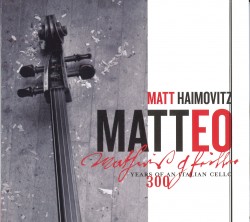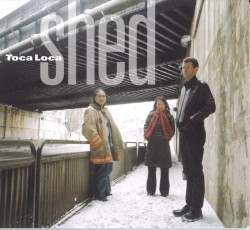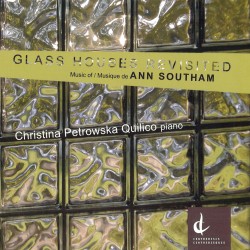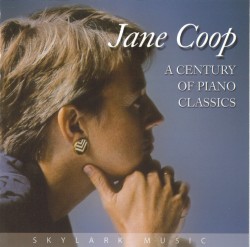 The latest release from cellist Matt Haimovitz whose Matteo (Oxingale OX2018) celebrates 300 years of Italian cello, his own cello that is, a Matteo Goffriller built in 1710. I have often realized that there is more of a common sensibility between so called early music and contemporary music than with the stylistic periods which fell between the two. Haimovitz seems to share this opinion. The disc intersperses some of the earliest pieces written for solo cello - six of the seven Ricercare composed by Domenico Gabrielli in 1689 – with works firmly rooted in the music of our time. I was quite surprised when the first track, Gabrielli’s Ricercare 7, began and what I heard was the opening phrase of Bach’s Solo Cello Suite No. 2. It turns out that the first three bars of the Gabrielli, whole notes D, A and F, may, according to the liner notes, be heard as accompaniment to “an imagined melody” and in this case Haimovitz imagined the opening of Bach’s suite and subsequently improvised on that before joining Gabrielli in the fourth bar. Luciano Berio’s Sequenza XIV (2002) takes pride of place as the first contemporary work on the disc. Dedicated to Rohan de Saram, it draws extensively on the Kandyan drumming tradition of the dedicatee’s Sri Lankan heritage. The most recent work is a 2010 contribution from Haimovitz’s McGill colleague Brian Cherney whose Capriccio references many great solo cello works in a true celebration of the instrument with signature nods (in nomenclature) to Bach, Haimovitz and Goffriller along the way. Works by Luigi Dallapiccola, Salvatore Sciarrino and Claudio Ambrosini complete the disc. The playing is heartfelt and convincing, with glorious sound throughout.
The latest release from cellist Matt Haimovitz whose Matteo (Oxingale OX2018) celebrates 300 years of Italian cello, his own cello that is, a Matteo Goffriller built in 1710. I have often realized that there is more of a common sensibility between so called early music and contemporary music than with the stylistic periods which fell between the two. Haimovitz seems to share this opinion. The disc intersperses some of the earliest pieces written for solo cello - six of the seven Ricercare composed by Domenico Gabrielli in 1689 – with works firmly rooted in the music of our time. I was quite surprised when the first track, Gabrielli’s Ricercare 7, began and what I heard was the opening phrase of Bach’s Solo Cello Suite No. 2. It turns out that the first three bars of the Gabrielli, whole notes D, A and F, may, according to the liner notes, be heard as accompaniment to “an imagined melody” and in this case Haimovitz imagined the opening of Bach’s suite and subsequently improvised on that before joining Gabrielli in the fourth bar. Luciano Berio’s Sequenza XIV (2002) takes pride of place as the first contemporary work on the disc. Dedicated to Rohan de Saram, it draws extensively on the Kandyan drumming tradition of the dedicatee’s Sri Lankan heritage. The most recent work is a 2010 contribution from Haimovitz’s McGill colleague Brian Cherney whose Capriccio references many great solo cello works in a true celebration of the instrument with signature nods (in nomenclature) to Bach, Haimovitz and Goffriller along the way. Works by Luigi Dallapiccola, Salvatore Sciarrino and Claudio Ambrosini complete the disc. The playing is heartfelt and convincing, with glorious sound throughout.
 The latest release from contemporary trio Toca Loca – Gregory Oh (Toronto) and Simon Docking (Halifax), pianos; Aiyun Huang (Montreal), percussion – entitled Shed (www.henceforthrecords.com) includes works from Canada, Japan, Switzerland and the USA all composed since 2002. Dai Fujikura’s Half-Remembered City for piano four-hands was written for a husband and wife piano duo and conceived as a depiction of intimacy in the way that the pianists have to manoeuvre and intertwine at the keyboard to realize the score, sometimes caressing adjoining notes and at others seemingly locked in territorial combat. At times comic in live performance, I am pleased to report that this disc proves you don’t have to see it played to be enthralled. All the works are strong and individual. Heinz Holliger’s Ma’Mounia for percussion solo and quintet of flute, clarinet, horn, cello and piano is kind of a signature tune for Huang who won the Geneva International Music Competition in 2002 where it was the required work. Frederic Rzewski’s Bring Them Home continues that composer’s political engagement in a set of variations on a 17th century Irish anti-war song Siuil A Run “that speaks of the past but turns our eyes to the present.” The highlight for me is Andrew Staniland’s Adventuremusic: Love Her Madly for two prepared pianos, five pieces of wood, five temple bowls and tape. It opens with driving rhythms somewhat reminiscent of Rzewski’s classic Winnsboro Cotton Mill Blues but over 15 minutes develops into a disturbing portrait of climate change as we hear the sounds of processed voice and temple bowls juxtaposed with disintegrating polar ice sheets. “Shed” will be launched with a performance at the Open Ears Festival in Kitchener-Waterloo on April 30.
The latest release from contemporary trio Toca Loca – Gregory Oh (Toronto) and Simon Docking (Halifax), pianos; Aiyun Huang (Montreal), percussion – entitled Shed (www.henceforthrecords.com) includes works from Canada, Japan, Switzerland and the USA all composed since 2002. Dai Fujikura’s Half-Remembered City for piano four-hands was written for a husband and wife piano duo and conceived as a depiction of intimacy in the way that the pianists have to manoeuvre and intertwine at the keyboard to realize the score, sometimes caressing adjoining notes and at others seemingly locked in territorial combat. At times comic in live performance, I am pleased to report that this disc proves you don’t have to see it played to be enthralled. All the works are strong and individual. Heinz Holliger’s Ma’Mounia for percussion solo and quintet of flute, clarinet, horn, cello and piano is kind of a signature tune for Huang who won the Geneva International Music Competition in 2002 where it was the required work. Frederic Rzewski’s Bring Them Home continues that composer’s political engagement in a set of variations on a 17th century Irish anti-war song Siuil A Run “that speaks of the past but turns our eyes to the present.” The highlight for me is Andrew Staniland’s Adventuremusic: Love Her Madly for two prepared pianos, five pieces of wood, five temple bowls and tape. It opens with driving rhythms somewhat reminiscent of Rzewski’s classic Winnsboro Cotton Mill Blues but over 15 minutes develops into a disturbing portrait of climate change as we hear the sounds of processed voice and temple bowls juxtaposed with disintegrating polar ice sheets. “Shed” will be launched with a performance at the Open Ears Festival in Kitchener-Waterloo on April 30.
 On March 17 at Glenn Gould Studio Christina Petrowska Quilico releases Music of Ann Southam - Glass Houses Revisited (Centrediscs CMCCD 16511), a re-working of the “fiendishly difficult etudes” the pianist was working on with the composer at the time of her death last November. (You can read Christina’s tribute to Ann elsewhere in these pages.) Originally composed in 1981, the title Glass Houses refers to minimalist composer Philip Glass, the best known proponent of this style at the time, and to choreographer Christopher House with whom Southam worked extensively. The mostly ebullient, busily joyful pieces were revised in 2009 for Petrowska Quilico and further edited by her with the composer’s permission for this recording in 2010. The disc features nine “favourite” selections from the set of 15, arranged with four lively pieces on either side of the solitary “broody and moody” track, Glass Houses No.13. Overall they are a weaving and embroidering of various melodic motifs that, in Southam’s words “reflect the nature of traditional women’s work – repetitive, life-sustaining, requiring time and patience.” One can only imagine the patience and diligence required of Petrowska Quilico to master these complex and exhilarating gems, and master them she has, as you can hear for yourself on March 17. There is a public memorial celebration of the life and music of Ann Southam being planned for April 21.
On March 17 at Glenn Gould Studio Christina Petrowska Quilico releases Music of Ann Southam - Glass Houses Revisited (Centrediscs CMCCD 16511), a re-working of the “fiendishly difficult etudes” the pianist was working on with the composer at the time of her death last November. (You can read Christina’s tribute to Ann elsewhere in these pages.) Originally composed in 1981, the title Glass Houses refers to minimalist composer Philip Glass, the best known proponent of this style at the time, and to choreographer Christopher House with whom Southam worked extensively. The mostly ebullient, busily joyful pieces were revised in 2009 for Petrowska Quilico and further edited by her with the composer’s permission for this recording in 2010. The disc features nine “favourite” selections from the set of 15, arranged with four lively pieces on either side of the solitary “broody and moody” track, Glass Houses No.13. Overall they are a weaving and embroidering of various melodic motifs that, in Southam’s words “reflect the nature of traditional women’s work – repetitive, life-sustaining, requiring time and patience.” One can only imagine the patience and diligence required of Petrowska Quilico to master these complex and exhilarating gems, and master them she has, as you can hear for yourself on March 17. There is a public memorial celebration of the life and music of Ann Southam being planned for April 21.
 Celebrated Vancouver pianist Jane Coop will make a rare Toronto appearance at Mooredale Concerts on March 20 performing works by Beethoven and Scriabin. We somehow overlooked her most recent CD - A Century of Piano Classics (www.skylark-music.com) - when it was released in 2009 so I’m pleased to have this opportunity to bring it to your attention. The disc includes an early Beethoven sonata from 1797, Chopin’s Ballade No.4 (1842) and four late works by Brahms from 1893. The century in question was an important one in the history of the piano, seeing it expand from a five octave instrument to its current 88 keys thanks in great part to the vision and virtuosic demands of the composers mentioned above and others such as Schumann and Liszt. Coop excels at this repertoire as this welcome disc attests. Recorded at the Chan Centre for the Performing Arts at UBC, the sound is clear and resonant.
Celebrated Vancouver pianist Jane Coop will make a rare Toronto appearance at Mooredale Concerts on March 20 performing works by Beethoven and Scriabin. We somehow overlooked her most recent CD - A Century of Piano Classics (www.skylark-music.com) - when it was released in 2009 so I’m pleased to have this opportunity to bring it to your attention. The disc includes an early Beethoven sonata from 1797, Chopin’s Ballade No.4 (1842) and four late works by Brahms from 1893. The century in question was an important one in the history of the piano, seeing it expand from a five octave instrument to its current 88 keys thanks in great part to the vision and virtuosic demands of the composers mentioned above and others such as Schumann and Liszt. Coop excels at this repertoire as this welcome disc attests. Recorded at the Chan Centre for the Performing Arts at UBC, the sound is clear and resonant.
We welcome your feedback and invite submissions. CDs and comments should be sent to: The WholeNote, 503 – 720 Bathurst St. Toronto ON M5S 2R4.
David Olds
DISCoveries Editor
discoveries@thewholenote.com



